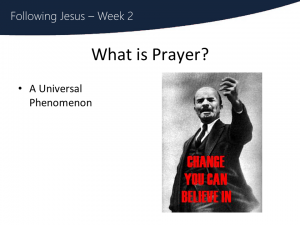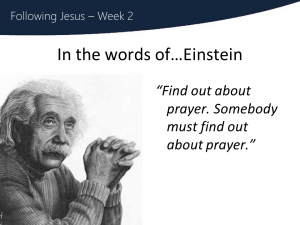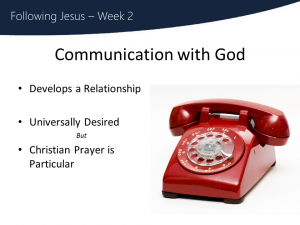
First, I should say the concept of prayer seems to be an utterly universal phenomenon. It seems to have been present in every culture, in every country, at every time in human history. Even atheists seem to find ways to pray.
During the heady days of communism in Russia, people used to place a portrait of Lenin in a corner in their home, where Christians used to keep icons. Pravda, the Russian newspaper, ran this advice for readers in 1952. If you meet difficulties in your work, or suddenly doubt your abilities, think of him, and you will find the confidence you need. If you are seeking a correct decision, think of him and you will find that decision.

A doctoral student at Princeton University once asked Albert Einstein, “What is there left in the world for original dissertation research?” Einstein replied, “Find out about prayer. Somebody must find out about prayer.”
Prayer is a universal concept, Einstein knew that, and it is universal because it speaks to a basic human need. We seem to have some deep sense that we are incomplete, even if we can’t use words to describe it. Remember that God shaped hole in our hearts, a deep longing inside of us that only a relationship with God can fill. The universal urge to pray, to speak beyond ourselves, is a clue to the existence of that hole, that gap within ourselves that we are always trying to fill.
Christians believe that this universal urge to pray, is our yearning to connect with God, and so for a Christian, a follower of Jesus, prayer is not just a concept, or a self-help practice, but a real human conversation with God. It’s as simple as that.
Christians believe that God is always listening to us—we will look later at whether God answers all of requests, and explore “does prayer work?”, but let’s start on the assumption that God is always there— ready to have that conversation with us.
Prayer is in fact the most important activity in our lives because it is the main way that we develop our relationship with God. We saw in C101 how God is calling us into relationship through Jesus and last week we looked at how we can we read the Bible to learn more about ourselves and learn more about God. But if we are going to build that relationship we read about in the Bible, we need to learn how to pray. Anybody know the top three causes of divorce of relationship breakdown????—lack of communication, finances, and extended family dynamics.

Prayer is about building that communication with God, communication which is at the heart of any healthy relationship. It is tragedy when prayer is simply reduced to a ritual— and when we pray it is the context of a wonderful relationship, a relationship with God that we are all working on and developing. And while the desire to connect with God through prayer seems universal, Christians have come to understand prayer in a specific way. It is prayer not to some unknown being, but to our Father, and we have the right to speak to God this way because of Jesus, and the ability to pray is not based on our cleverness or our holiness, but through the power of the Holy Spirit. What does that all mean?
Christian prayer is prayer “to our Father”. Jesus taught us to pray, “Our father in heaven.” Many people grow up with a view of God being distant, a sort of grumpy old grandfather in the sky. And for some people, thinking of God as a father is a very painful and hard to do, because their earthly fathers’ abuse has forever spoiled that word for them. For others of us, we can be overwhelmed by the vastness of God, and it is no wonder that down the centuries some Christians have felt more comfortable praying to saints or relying on other intermediaries. But Jesus said, pray to your father. Jesus shows us that God is our loving Father and we have the extraordinary privilege of being able to come into his presence and call him Abba—this is the Aramaic word that Jesus used when teaching the disciples how to pray—the closest English word we have is probably “daddy”. There is a remarkable intimacy about our relationship with God and about praying to our Father in heaven.
But how can we dare approach God the Father this way in prayer? You would think we are too small, too insignificant, too broken and messed up to do such a thing. We can’t even approach the Queen of England, and we dare imagine we can approach God in prayer and call him Daddy?
But the amazing thing is, we can. Christian prayer to that heavenly father is done through the Son, Jesus. He gives us this awesome ability to speak to God, despite our brokenness. In his letter to the Ephesians Paul prays that “through him (Jesus) we both (Jews and Gentiles) have access to the Father by the one Spirit.” (2:18) It is normal for Christians to end all their prayers with “through Jesus Christ, or in the name of Jesus we pray.” This is not just some magic formula, but an acknowledgement that it is Jesus that has opened up the possibility for us to have a relationship with God. Jesus opens the door, Jesus removed that barrier of sin through his death on the cross, that barrier that separates us from God. Very often I hear people say, “Well I can’t sense God in my life…” More often than not, that is the barrier that sin builds up between us and God. That barrier is what Jesus broke down, so that we can now approach God, our heavenly father, in prayer.

So we are speaking to our Father, through Jesus, and in the power of the Holy Spirit. We looked in C101 how the Spirit is the Spirit of Jesus that comes to live in all Jesus followers, that active presence of God in our lives. It can be hard to pray, but God has not left us alone. We don’t have to pray using specific words to get God’s attention. God has given us his Spirit to live within us and help us to pray.
Question: How have you begun or address your prayers before? Where did you learn this?
